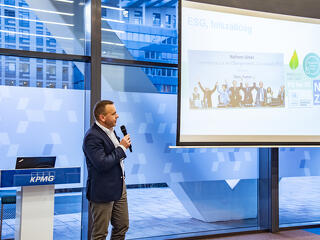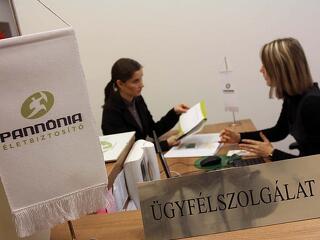An investment in the future
The prices charged give rise to the question: just who goes on these courses? According to data from the Open Business School the majority of students choosing this form of training in the recent past were from the over-40 age bracket. This trend, however, is reversing, and an increasing number of school leavers are to be found in the ranks of the students today. Another interesting tendency is that more and more students consider the tuition fees a type of investment, with families "pooling their resources" to get the money together.
The word 'consider' is perhaps not even justified, as a better job and salary are almost automatic for those completing the courses. This is borne out by the fact that two thirds of those completing the course move up the corporate ladder. The remaining third do not receive promotion as a result of the course because - on the basis of a study by the Open Business School - they were already a successful executive, or at the top of the company.
In examining the situation with regard to salaries, the OBS divided students into three groups - those who graduated more than five years previously, women, and new graduates. In the first category gross salaries increased 41-42 per cent in the years following graduation, but even in the fourth year the rate of increase was 34 per cent. A similar trend was shown in the case of women. But one striking statistic is that while before the course 52 per cent of the women had lower salaries than male colleagues holding the same position, after graduation this percentage fell to 13 per cent.
But how does this translate into forints? While male managers grossed an average of 1.12 million forints before gaining the MBA, this rose to 7.33 million forints within five years of graduation. The salaries of women rose to 6.7 million forints three-four years after gaining the qualification, while new graduates earned double their original salary, at 5 million forints.
For purposes of comparison: graduates from the better European business schools can demand annual salaries of 75-85,000 dollars, while those graduating from the Harvard Business School earn 110,000 dollars. Granted, they get this money straight after graduating.
The situation in Eastern Europe
In the Czech Republic there are around 15 schools offering MBA training, and it is estimated that 700-800 people can gain this 'top qualification' every year. The majority of the schools import teaching materials through an American or British partner institution. The courses can last two to three years. Entry requirements are a higher education degree, two-three years professional experience, and (at least) passive language skills. Tuition fees are around 120,000-160,000 Czech crowns. There is less choice in Slovakia: citizens of Bratislava have only three institutions to choose between. According to unofficial data on 31 have gained an MBA diploma to date. Poland is at the forefront of the region, which 16 institutions to choose between, on the basis of tradition, or price. The latter factor is not coincidental, as the tuition fees can vary from 15,100 zlotys right up to 51,000. According to data from Warsaw several thousand complete some kind of MBA course every year. The majority of institutions maintain close links with a respected Polish university, although international co-operation is also commonplace. I Croatia only three institutions are concerned with post-graduate management training, tuition fees are around 15,000 German marks. Studies have shown that the majority of students are from abroad, or senior executives at privately owned companies. There is only one institution in Romania offering accredited MBA qualifications, but the number of students is treated as a business secret. It was revealed, however, that around three-quarters are sent by multinational corporations. The 450-480 dollar tuition fees at each level make this understandable.
Accreditation
The requirements for MBA training have been regulated by a ruling by the prime minister for about a year now. However, for the time being only state institutes of higher education have been accredited by the state. On the other hand, they did not have to take any special measures, as they were automatically given official recognition when the ruling came into force. The majority of business schools in Hungary are registered as companies in this country, and carry out their educational activity thus. But this does not mean that the diplomas gained here are of less worth: students on non-accredited courses can apply individually to have their MBAs recognised. The reason for this is that most of the schools are accredited with British or American universities or colleges. The business schools are of the opinion that it would not be advantageous to award the grades used by the Hungarian educational system. This has its own logic, as accession to the European Union will mean automatic recognition of the qualifications all over Europe.
It pays to specialise
The main means of reducing the costs of distribution is logistics. This is why companies from the various sectors are trying to do everything they can to optimise - as much as possible - the flow of goods from the places of production to the consumer. This is the justification given by higher education institutes for the importance of creating a logistical major within their syllabus structures. This is precisely what make it so strange that business schools, which in the majority of cases teach extremely practical skills, have not started their own logistical training courses. However, it is also true that the above mentioned form of training does exist among the miscellaneous training courses, as a kind of optional module.























